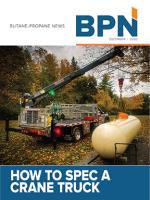Wednesday, December 9, 2020
By Frank Thompson… This statement drives fear into every propane marketer and their insurance agent’s heart. However, this statement that a claim is not covered could be you, if you are providing dispenser equipment to a non-owned bottle fill site.

The insurance company wants you and your company to be able to sell more propane. They have asked numerous questions about your safety procedures in order for you to get a quote from them. They must be satisfied that you are capable to sell and deliver propane safely before they insure you.
Their quote provides property, general liability, and auto coverage for your company. It does not cover the interest of non-owned third parties that utilize your equipment to sell and dispense propane.
An example of this is a propane marketer that installs a dispenser at a non-owned RV park. The dispenser is owned and maintained by the marketer. However, the RV park utilizes one of their employees to fill a customer-owned propane tank. Both the propane marketer and the RV park receive a financial benefit from the agreement.
The problem arises when the RV park is a non-owned third party and the dispenser and general liability is not covered under the marketer’s insurance policy. Many insurance companies exclude non-owned dispensers because they don’t know anything about the risk.
This problem has recently resurfaced when a propane marketer placed his dispenser at a non-owned third-party location, which then had a problem filling a bottle. There was an explosion at the non-owned location that seriously burned their employee and another person, then burned the RV to the ground along with destroying the dispenser. Who is responsible?
The marketer’s insurance company? The non-owned third-party entity whose employee was trying to fill the propane tank? Whose job was it to train the employee how and when to fill a propane tank? Was there a written contract between the marketer and the non-owned entity? What a mess.
What every marketer should do if you have any owned dispensers placed at a non-owned location:
Frank B. Thompson is a chartered property and casualty underwriter based in Phoenix. He is the owner of PT Risk Management, an independent insurance company specializing in writing propane and petroleum risk policies throughout the U.S.

The insurance company wants you and your company to be able to sell more propane. They have asked numerous questions about your safety procedures in order for you to get a quote from them. They must be satisfied that you are capable to sell and deliver propane safely before they insure you.
Their quote provides property, general liability, and auto coverage for your company. It does not cover the interest of non-owned third parties that utilize your equipment to sell and dispense propane.
An example of this is a propane marketer that installs a dispenser at a non-owned RV park. The dispenser is owned and maintained by the marketer. However, the RV park utilizes one of their employees to fill a customer-owned propane tank. Both the propane marketer and the RV park receive a financial benefit from the agreement.
The problem arises when the RV park is a non-owned third party and the dispenser and general liability is not covered under the marketer’s insurance policy. Many insurance companies exclude non-owned dispensers because they don’t know anything about the risk.
This problem has recently resurfaced when a propane marketer placed his dispenser at a non-owned third-party location, which then had a problem filling a bottle. There was an explosion at the non-owned location that seriously burned their employee and another person, then burned the RV to the ground along with destroying the dispenser. Who is responsible?
The marketer’s insurance company? The non-owned third-party entity whose employee was trying to fill the propane tank? Whose job was it to train the employee how and when to fill a propane tank? Was there a written contract between the marketer and the non-owned entity? What a mess.
What every marketer should do if you have any owned dispensers placed at a non-owned location:
- Provide your insurance company with the physical address of the dispenser.
- Train and document training of all employees authorized to fill propane cylinders.
- Obtain a written contract that requires the non-owned location, among other things, to insure the propane operation for $1 million per occurrence and provide you with a certificate of insurance naming your company as an additional insured.
- Decide in advance which party is to insure the dispenser and for how much. If the non-owned location is to insure the equipment, require proof of insurance.
- Get a hold harmless clause from the non-owned location.
Frank B. Thompson is a chartered property and casualty underwriter based in Phoenix. He is the owner of PT Risk Management, an independent insurance company specializing in writing propane and petroleum risk policies throughout the U.S.



